#desisting
Text
A personal account of detransition, reasons for it, and pain points with the community
So, on this hellsite, I am going to address a spicy topic. I'm not sure I should, but I believe I am not alone and it is a virtue to speak up.
I must preface this with saying that I wish no one harm, nor do I impose choices on others. I wish to be seen and to let others feel seen.
I'm a 26-year-old MtF dentransitioner (a desister, more accurately). (Pardon my oldschool language, but there is clarity in it which the modern lingo lacks). I have comorbid(?) ADHD with strong autistic traits, but I wouldn't call myself autistic - this is just a manifestation of ADHD and poor socialization.
My decision to detransition is not one made out of self-hatred, or "internal transphobia" as some might claim. I stay every bit as feminine (which is not very) in my expression. I desisted because I - and frankly, I'm not alone - have been systematically mislead about benefits and drawbacks of these procedures.
Let's start off with a banger I found today, which tipped my scales. Here's a study that simultaneously purports to alleviate detransitioning fears, and is so starkingly bad at it that it is still cited by far-right haters: https://academic.oup.com/jcem/article-abstract/107/9/e3937/6572526
This study finds a desistance rate close to 20% in natal males (amab) and 30% in natal females (afab), but puts a positive spin on it. "More than 70% continue with the treatment!" What it omits, and what every endocrinologist worth their salt will tell you, is that those who don't often walk away with severe reproductive dysfunction, depression, and hormonal imbalances. And that's not even taking the Bottom Surgery into account. (See below). That 30% number may seem awfully high, but it checks out among those with whom I kept company in my young adulthood. Rates up to 10% have been suggested by studies before.
This is not the topic that you can bring up in a polite society, much less inside The Community. The Community is hardened by years of fighting war trolls from 4chan, evil witches of TERF, and dissenters in general.
The Community will tell you that every dissenter is a plant. The Community will delete posts of detrans/trans regret pains on suspicion of nothing from relevant subreddiys, then proceed to defend the decision by saying the posts are no longer there, so the posters must be trolls. There's absolutely zero genuine discussion being fostered about actual neccesity and efficacy of, let's face it, invasive care - facts are weapons in the Culture War on Trans Folk, therefore inconvenient ones must be silenced.
I recently saw a post making rounds, clsiming yet again that regret rates of "bottom surgeries" (SRS, or genital reassignments) are less than 1%. Another brings up that this is literally less than for heart surgery - on top of being implausibly small for any invasive surgery - but this is then framed as the evidence for wonder and neccesity of care. Needless to say, there's nary a cited source in sight. Indeed, I've seen the 99%/1% claim many times on what looks like powerpoint slides, never with a citation.
The numbers you can find on PubMed are less fun. Immediate rates of complication is, by different accounts, from 25 to 50 per cent (I am a hypocrite and providing no sources, searching PubMed isn't hard and you get a fuller picture than if I gave youa single link). The most frequent one is tissue degeneration - essentially graft rejection - in about a third of cases. Even in the best case, neogenitalia are numb (because nerve healing, insofar it occurs at all, takes about a decade), floppy, cause urination problems and are frequently inflamed. Nevertheless, the operations are advertised (even by surgeons, who should know better) as giving you "fully functional" genitalia, and popular hearsay would have you believe that you get a cool cyberpussy which is a hundred times better. It's not. Plastic surgery is appearance-only, functions are limited and incidental, and operations have no standard procedure.
When I last brought it up in my trans chat, the first person to reply did so using a phrase "I know you masturbate to axe-wounds on Reddit, but..." It didn't get much more civil than that.
This is far from atypical, btw. Much can be saud about transfem communities recently eschewing any reflection on learned toxic masculinity, or, indeed, making themselves less of a man outside or inside - the work can be relegated to magical hormones.
I'm going to go there, too. Call me a lookist, a transphobe, a bitter fuckup. Maybe I am. But imma say out loud:
Hormones will not make you pass. Also, passing is a real, non-arbitrary thing.
The Community, right now, will not tell you that you do not look like your desired gender. It is considered rude, sometimes hateful, and a general faux pas. I absolutely get the reasons for this, and I used to stand behind and to perpetrate those reasons. However, after seeing more and more people changing their documents and getting bottom surgeries before getting to shave their neckbeards, I realize that might not be a good thing.
As an ADHD person, I am often confused about things. As a troubled person, I was often confused about myself. I thought that if I hayed myself and liked girls and feminine things, then I must become a girl to love myself. I now realize that is not true. I am lucky to make my realization before making truly irreversible decisions, and am content with minor health complications as a price of self-discovery. Still, I know some who paid a steeper price, and I wonder how many more will.
I leave you with a link to Society for Evidence-based Gender Medicine, which I found today, for most succinctly putting most of the talking points I wish I could express myself. They're the reason I'm bothering to make the post at all - by myself, I'm not a very persuasive person. https://segm.org/Dutch-studies-critically-flawed
#trans care#transitioning#detransitioning#desisting#detransitioner#desister#hormone replacement therapy#hrt#sex reassignment surgery#srs#personal#horrible bigotry
5 notes
·
View notes
Text
also i’m a desister, not a detransitioner. i never medically transitioned and even 15 year old me knew binding and constant discomfort was fucking stupid. this was when i thought it was possible to be done safely too, before (as an adult) speaking to other TIFs who reported long-term rib and lung damage and breathing problems despite following all precautions laid out for them.
you put an autistic kid in a binder, THAT is sensory hell. one of the lowest points of my life.
4 notes
·
View notes
Text
Follando duro a Mi primo gay
INTERCAMBIO DE FOTOS Y VIDEOS ENTRE MI PAREJA Y SU AMANTE BANDIDO
shara pantyhose: in wolford pantyhose and pencil skirt
Bbw milf shows her big bouncing tits
Lesbian sex compilation - pussy licking and nipple play
Safadao mandou chuparbas bolas dele ela amou e levou prra no peitinho
High school boys showing off naked and natural old gay sex first time
Emma, une beurette qui aime se filmer aux toilettes
XXL anal fisting and fire extinguisher fuck
Big Tit Mexican College Girl Fucked By Older Cumshot Daddy
#haute-piece#teletyped#anoestrum#beleaguerment#levarterenol#gyroceracone#tribophosphorescent#Eberly#microbism#prematuration#unhealthy#zuurveldt#thiozonid#yuckle#sports#brooches#sci.#desisting#moiling#unrheumatic
0 notes
Text


"Desist!"
Sketch commissions for Muki on X
#desist! could be a wonderful series too 😆#I will be back soon with we dont have a cat soon as well#transformers#starscream#decepticons#maccadam#soundwave
1K notes
·
View notes
Text
“Palworld’s just a rip off of Pokemon!” “Palworld is Plagerizing!” “Palworld creatures look too much like Pokemon!”

#Pokémon#Digimon#monster rancher#Palworld#Nintendo would have already been on their asses with a cease and desist if this was a serious issue#let’s just enjoy the Pokémon with guns game ok#memes#video games
1K notes
·
View notes
Text

got too crazy last night & made a fake Gerard Fangoria cover... 🧛♀️
📸: Jess Gleeson
#omtai art#mcr#mcrsydney#i had a dream i got a cease and desist from tumblr if i posted this...#But its literally fine and nobody cares and jimmy from fangoria said its fine#my brain so wack#anyways. making this was so so fun#the bordering on the logo is really fucky btw so dont look too hard at it#cuz i couldnt find a highres vector anywhere so i had to screenshot the svg off the site 😭 & then magicwand it#but the site didnt have the border so i had 2 add it myself#and its too thick and wraps weirdly but Deal with it i dont have photoshop i made this in csp#also god bless the people at mcrchive for making clean drumhead writings. i was fully prepared to just do it myself#i did for the 'in the swarm' tho its really hard trying to digitally mimic drip markers...#i wanted to put the guys in the boxes on the side but the photographer didnt post any photos of frank#if they took any#and it was like 4am at that point i dndt wanna go hunt for a frank photo from that night#So this is the gerard solo cover. enjoy#blood
1K notes
·
View notes
Text

graphic design is one of my passions
#feel free to send me a cease and desist letter if somebody has already done this#the tf2 community is a hivemind after all#tf2#team fortress 2#tf2 memes#tf2 engineer#tf2 scout#tf2 soldier#tf2 demoman#tf2 pyro#tf2 spy#tf2 heavy#tf2 medic#tf2 sniper
2K notes
·
View notes
Text
Holy shit, the New York Times is FINALLY interviewing and listening to detransistioners.
The tide is turning.
Opinion by Pamela Paul
As Kids, They Thought They Were Trans. They No Longer Do.
Feb. 2, 2024

Grace Powell was 12 or 13 when she discovered she could be a boy.
Growing up in a relatively conservative community in Grand Rapids, Mich., Powell, like many teenagers, didn’t feel comfortable in her own skin. She was unpopular and frequently bullied. Puberty made everything worse. She suffered from depression and was in and out of therapy.
“I felt so detached from my body, and the way it was developing felt hostile to me,” Powell told me. It was classic gender dysphoria, a feeling of discomfort with your sex.
Reading about transgender people online, Powell believed that the reason she didn’t feel comfortable in her body was that she was in the wrong body. Transitioning seemed like the obvious solution. The narrative she had heard and absorbed was that if you don’t transition, you’ll kill yourself.
At 17, desperate to begin hormone therapy, Powell broke the news to her parents. They sent her to a gender specialist to make sure she was serious. In the fall of her senior year of high school, she started cross-sex hormones. She had a double mastectomy the summer before college, then went off as a transgender man named Grayson to Sarah Lawrence College, where she was paired with a male roommate on a men’s floor. At 5-foot-3, she felt she came across as a very effeminate gay man.
At no point during her medical or surgical transition, Powell says, did anyone ask her about the reasons behind her gender dysphoria or her depression. At no point was she asked about her sexual orientation. And at no point was she asked about any previous trauma, and so neither the therapists nor the doctors ever learned that she’d been sexually abused as a child.
“I wish there had been more open conversations,” Powell, now 23 and detransitioned, told me. “But I was told there is one cure and one thing to do if this is your problem, and this will help you.”
Progressives often portray the heated debate over childhood transgender care as a clash between those who are trying to help growing numbers of children express what they believe their genders to be and conservative politicians who won’t let kids be themselves.
But right-wing demagogues are not the only ones who have inflamed this debate. Transgender activists have pushed their own ideological extremism, especially by pressing for a treatment orthodoxy that has faced increased scrutiny in recent years. Under that model of care, clinicians are expected to affirm a young person’s assertion of gender identity and even provide medical treatment before, or even without, exploring other possible sources of distress.
Many who think there needs to be a more cautious approach — including well-meaning liberal parents, doctors and people who have undergone gender transition and subsequently regretted their procedures — have been attacked as anti-trans and intimidated into silencing their concerns.
And while Donald Trump denounces “left-wing gender insanity” and many trans activists describe any opposition as transphobic, parents in America’s vast ideological middle can find little dispassionate discussion of the genuine risks or trade-offs involved in what proponents call gender-affirming care.
Powell’s story shows how easy it is for young people to get caught up by the pull of ideology in this atmosphere.
“What should be a medical and psychological issue has been morphed into a political one,” Powell lamented during our conversation. “It’s a mess.”
A New and Growing Group of Patients
Many transgender adults are happy with their transitions and, whether they began to transition as adults or adolescents, feel it was life changing, even lifesaving. The small but rapidly growing number of children who express gender dysphoria and who transition at an early age, according to clinicians, is a recent and more controversial phenomenon.
Laura Edwards-Leeper, the founding psychologist of the first pediatric gender clinic in the United States, said that when she started her practice in 2007, most of her patients had longstanding and deep-seated gender dysphoria. Transitioning clearly made sense for almost all of them, and any mental health issues they had were generally resolved through gender transition.
“But that is just not the case anymore,” she told me recently. While she doesn’t regret transitioning the earlier cohort of patients and opposes government bans on transgender medical care, she said, “As far as I can tell, there are no professional organizations who are stepping in to regulate what’s going on.”

Most of her patients now, she said, have no history of childhood gender dysphoria. Others refer to this phenomenon, with some controversy, as rapid onset gender dysphoria, in which adolescents, particularly tween and teenage girls, express gender dysphoria despite never having done so when they were younger. Frequently, they have mental health issues unrelated to gender. While professional associations say there is a lack of quality research on rapid onset gender dysphoria, several researchers have documented the phenomenon, and many health care providers have seen evidence of it in their practices.
“The population has changed drastically,” said Edwards-Leeper, a former head of the Child and Adolescent Committee for the World Professional Association for Transgender Health, the organization responsible for setting gender transition guidelines for medical professionals.
For these young people, she told me, “you have to take time to really assess what’s going on and hear the timeline and get the parents’ perspective in order to create an individualized treatment plan. Many providers are completely missing that step.”
Yet those health care professionals and scientists who do not think clinicians should automatically agree to a young person’s self-diagnosis are often afraid to speak out. A report commissioned by the National Health Service about Britain’s Tavistock gender clinic, which, until it was ordered to be shut down, was the country’s only health center dedicated to gender identity, noted that “primary and secondary care staff have told us that they feel under pressure to adopt an unquestioning affirmative approach and that this is at odds with the standard process of clinical assessment and diagnosis that they have been trained to undertake in all other clinical encounters.”
Of the dozens of students she’s trained as psychologists, Edwards-Leeper said, few still seem to be providing gender-related care. While her students have left the field for various reasons, “some have told me that they didn’t feel they could continue because of the pushback, the accusations of being transphobic, from being pro-assessment and wanting a more thorough process,” she said.
They have good reasons to be wary. Stephanie Winn, a licensed marriage and family therapist in Oregon, was trained in gender-affirming care and treated multiple transgender patients. But in 2020, after coming across detransition videos online, she began to doubt the gender-affirming model. In 2021 she spoke out in favor of approaching gender dysphoria in a more considered way, urging others in the field to pay attention to detransitioners, people who no longer consider themselves transgender after undergoing medical or surgical interventions. She has since been attacked by transgender activists. Some threatened to send complaints to her licensing board saying that she was trying to make trans kids change their minds through conversion therapy.
In April 2022, the Oregon Board of Licensed Professional Counselors and Therapists told Winn that she was under investigation. Her case was ultimately dismissed, but Winn no longer treats minors and practices only online, where many of her patients are worried parents of trans-identifying children.
“I don’t feel safe having a location where people can find me,” she said.
Detransitioners say that only conservative media outlets seem interested in telling their stories, which has left them open to attacks as hapless tools of the right, something that frustrated and dismayed every detransitioner I interviewed. These are people who were once the trans-identified kids that so many organizations say they’re trying to protect — but when they change their minds, they say, they feel abandoned.
Most parents and clinicians are simply trying to do what they think is best for the children involved. But parents with qualms about the current model of care are frustrated by what they see as a lack of options.
Parents told me it was a struggle to balance the desire to compassionately support a child with gender dysphoria while seeking the best psychological and medical care. Many believed their kids were gay or dealing with an array of complicated issues. But all said they felt compelled by gender clinicians, doctors, schools and social pressure to accede to their child’s declared gender identity even if they had serious doubts. They feared it would tear apart their family if they didn’t unquestioningly support social transition and medical treatment. All asked to speak anonymously, so desperate were they to maintain or repair any relationship with their children, some of whom were currently estranged.
Several of those who questioned their child’s self-diagnosis told me it had ruined their relationship. A few parents said simply, “I feel like I’ve lost my daughter.”
One mother described a meeting with 12 other parents in a support group for relatives of trans-identified youth where all of the participants described their children as autistic or otherwise neurodivergent. To all questions, the woman running the meeting replied, “Just let them transition.” The mother left in shock. How would hormones help a child with obsessive-compulsive disorder or depression? she wondered.
Some parents have found refuge in anonymous online support groups. There, people share tips on finding caregivers who will explore the causes of their children’s distress or tend to their overall emotional and developmental health and well-being without automatically acceding to their children’s self-diagnosis.
Many parents of kids who consider themselves trans say their children were introduced to transgender influencers on YouTube or TikTok, a phenomenon intensified for some by the isolation and online cocoon of Covid. Others say their kids learned these ideas in the classroom, as early as elementary school, often in child-friendly ways through curriculums supplied by trans rights organizations, with concepts like the gender unicorn or the Genderbread person.
‘Do You Want a Dead Son or a Live Daughter?’
After Kathleen’s 15-year-old son, whom she described as an obsessive child, abruptly told his parents he was trans, the doctor who was going to assess whether he had A.D.H.D. referred him instead to someone who specialized in both A.D.H.D. and gender. Kathleen, who asked to be identified only by her first name to protect her son’s privacy, assumed that the specialist would do some kind of evaluation or assessment. That was not the case.
The meeting was brief and began on a shocking note. “In front of my son, the therapist said, ‘Do you want a dead son or a live daughter?’” Kathleen recounted.
Parents are routinely warned that to pursue any path outside of agreeing with a child’s self-declared gender identity is to put a gender dysphoric youth at risk for suicide, which feels to many people like emotional blackmail. Proponents of the gender-affirming model have cited studies showing an association between that standard of care and a lower risk of suicide. But those studies were found to have methodological flaws or have been deemed not entirely conclusive. A survey of studies on the psychological effects of cross-sex hormones, published three years ago in The Journal of the Endocrine Society, the professional organization for hormone specialists, found it “could not draw any conclusions about death by suicide.” In a letter to The Wall Street Journal last year, 21 experts from nine countries said that survey was one reason they believed there was “no reliable evidence to suggest that hormonal transition is an effective suicide prevention measure.”
Moreover, the incidence of suicidal thoughts and attempts among gender dysphoric youth is complicated by the high incidence of accompanying conditions, such as autism spectrum disorder. As one systematic overview put it, “Children with gender dysphoria often experience a range of psychiatric comorbidities, with a high prevalence of mood and anxiety disorders, trauma, eating disorders and autism spectrum conditions, suicidality and self-harm.”
But rather than being treated as patients who deserve unbiased professional help, children with gender dysphoria often become political pawns.
Conservative lawmakers are working to ban access to gender care for minors and occasionally for adults as well. On the other side, however, many medical and mental health practitioners feel their hands have been tied by activist pressure and organizational capture. They say that it has become difficult to practice responsible mental health care or medicine for these young people.
Pediatricians, psychologists and other clinicians who dissent from this orthodoxy, believing that it is not based on reliable evidence, feel frustrated by their professional organizations. The American Psychological Association, American Psychiatric Association and the American Academy of Pediatrics have wholeheartedly backed the gender-affirming model.
In 2021, Aaron Kimberly, a 50-year-old trans man and registered nurse, left the clinic in British Columbia where his job focused on the intake and assessment of gender-dysphoric youth. Kimberly received a comprehensive screening when he embarked on his own successful transition at age 33, which resolved the gender dysphoria he experienced from an early age.
But when the gender-affirming model was introduced at his clinic, he was instructed to support the initiation of hormone treatment for incoming patients regardless of whether they had complex mental problems, experiences with trauma or were otherwise “severely unwell,” Kimberly said. When he referred patients for further mental health care rather than immediate hormone treatment, he said he was accused of what they called gatekeeping and had to change jobs.
“I realized something had gone totally off the rails,” Kimberly, who subsequently founded the Gender Dysphoria Alliance and the L.G.B.T. Courage Coalition to advocate better gender care, told me.
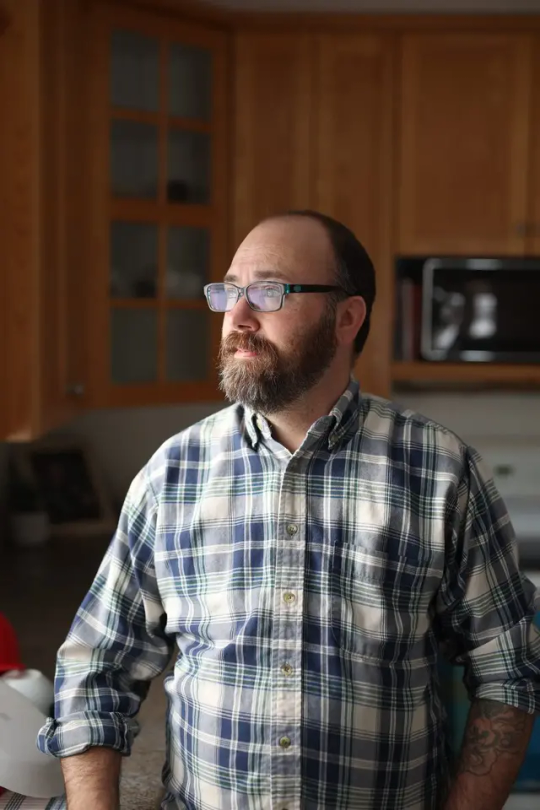
Gay men and women often told me they fear that same-sex-attracted kids, especially effeminate boys and tomboy girls who are gender nonconforming, will be transitioned during a normal phase of childhood and before sexual maturation — and that gender ideology can mask and even abet homophobia.
As one detransitioned man, now in a gay relationship, put it, “I was a gay man pumped up to look like a woman and dated a lesbian who was pumped up to look like a man. If that’s not conversion therapy, I don’t know what is.”
“I transitioned because I didn’t want to be gay,” Kasey Emerick, a 23-year-old woman and detransitioner from Pennsylvania, told me. Raised in a conservative Christian church, she said, “I believed homosexuality was a sin.”
When she was 15, Emerick confessed her homosexuality to her mother. Her mother attributed her sexual orientation to trauma — Emerick’s father was convicted of raping and assaulting her repeatedly when she was between the ages of 4 and 7 — but after catching Emerick texting with another girl at age 16, she took away her phone. When Emerick melted down, her mother admitted her to a psychiatric hospital. While there, Emerick told herself, “If I was a boy, none of this would have happened.”
In May 2017, Emerick began searching “gender” online and encountered trans advocacy websites. After realizing she could “pick the other side,” she told her mother, “I’m sick of being called a dyke and not a real girl.” If she were a man, she’d be free to pursue relationships with women.
That September, she and her mother met with a licensed professional counselor for the first of two 90-minute consultations. She told the counselor that she had wished to be a Boy Scout rather than a Girl Scout. She said she didn’t like being gay or a butch lesbian. She also told the counselor that she had suffered from anxiety, depression and suicidal ideation. The clinic recommended testosterone, which was prescribed by a nearby L.G.B.T.Q. health clinic. Shortly thereafter, she was also diagnosed with A.D.H.D. She developed panic attacks. At age 17, she was cleared for a double mastectomy.
“I’m thinking, ‘Oh my God, I’m having my breasts removed. I’m 17. I’m too young for this,’” she recalled. But she went ahead with the operation.
“Transition felt like a way to control something when I couldn’t control anything in my life,” Emerick explained. But after living as a trans man for five years, Emerick realized her mental health symptoms were only getting worse. In the fall of 2022, she came out as a detransitioner on Twitter and was immediately attacked. Transgender influencers told her she was bald and ugly. She received multiple threats.
“I thought my life was over,” she said. “I realized that I had lived a lie for over five years.”

Today Emerick’s voice, permanently altered by testosterone, is that of a man. When she tells people she’s a detransitioner, they ask when she plans to stop taking T and live as a woman. “I’ve been off it for a year,” she replies.
Once, after she recounted her story to a therapist, the therapist tried to reassure her. If it’s any consolation, the therapist remarked, “I would never have guessed that you were once a trans woman.” Emerick replied, “Wait, what sex do you think I am?”
To the trans activist dictum that children know their gender best, it is important to add something all parents know from experience: Children change their minds all the time. One mother told me that after her teenage son desisted — pulled back from a trans identity before any irreversible medical procedures — he explained, “I was just rebelling. I look at it like a subculture, like being goth.”
“The job of children and adolescents is to experiment and explore where they fit into the world, and a big part of that exploration, especially during adolescence, is around their sense of identity,” Sasha Ayad, a licensed professional counselor based in Phoenix, told me. “Children at that age often present with a great deal of certainty and urgency about who they believe they are at the time and things they would like to do in order to enact that sense of identity.”
Ayad, a co-author of “When Kids Say They’re Trans: A Guide for Thoughtful Parents,” advises parents to be wary of the gender affirmation model. “We’ve always known that adolescents are particularly malleable in relationship to their peers and their social context and that exploration is often an attempt to navigate difficulties of that stage, such as puberty, coming to terms with the responsibilities and complications of young adulthood, romance and solidifying their sexual orientation,” she told me. For providing this kind of exploratory approach in her own practice with gender dysphoric youth, Ayad has had her license challenged twice, both times by adults who were not her patients. Both times, the charges were dismissed.
Studies show that around eight in 10 cases of childhood gender dysphoria resolve themselves by puberty and 30 percent of people on hormone therapy discontinue its use within four years, though the effects, including infertility, are often irreversible.
Proponents of early social transition and medical interventions for gender dysphoric youth cite a 2022 study showing that 98 percent of children who took both puberty blockers and cross-sex hormones continued treatment for short periods, and another study that tracked 317 children who socially transitioned between the ages of 3 and 12, which found that 94 percent of them still identified as transgender five years later. But such early interventions may cement children’s self-conceptions without giving them time to think or sexually mature.
‘The Process of Transition Didn’t Make Me Feel Better’
At the end of her freshman year of college, Grace Powell, horrifically depressed, began dissociating, feeling detached from her body and from reality, which had never happened to her before. Ultimately, she said, “the process of transition didn’t make me feel better. It magnified what I found was wrong with myself.”
“I expected it to change everything, but I was just me, with a slightly deeper voice,” she added. “It took me two years to start detransitioning and living as Grace again.”
She tried in vain to find a therapist who would treat her underlying issues, but they kept asking her: How do you want to be seen? Do you want to be nonbinary? Powell wanted to talk about her trauma, not her identity or her gender presentation. She ended up getting online therapy from a former employee of the Tavistock clinic in Britain. This therapist, a woman who has broken from the gender-affirming model, talked Grace through what she sees as her failure to launch and her efforts to reset. The therapist asked questions like: Who is Grace? What do you want from your life? For the first time, Powell felt someone was seeing and helping her as a person, not simply looking to slot her into an identity category.
Many detransitioners say they face ostracism and silencing because of the toxic politics around transgender issues.
“It is extraordinarily frustrating to feel that something I am is inherently political,” Powell told me. “I’ve been accused multiple times that I’m some right-winger who’s making a fake narrative to discredit transgender people, which is just crazy.”
While she believes there are people who benefit from transitioning, “I wish more people would understand that there’s not a one-size-fits-all solution,” she said. “I wish we could have that conversation.”
In a recent study in The Archives of Sexual Behavior, about 40 young detransitioners out of 78 surveyed said they had suffered from rapid onset gender dysphoria. Trans activists have fought hard to suppress any discussion of rapid onset gender dysphoria, despite evidence that the condition is real. In its guide for journalists, the activist organization GLAAD warns the media against using the term, as it is not “a formal condition or diagnosis.” Human Rights Campaign, another activist group, calls it “a right-wing theory.” A group of professional organizations put out a statement urging clinicians to eliminate the term from use.
Nobody knows how many young people desist after social, medical or surgical transitions. Trans activists often cite low regret rates for gender transition, along with low figures for detransition. But those studies, which often rely on self-reported cases to gender clinics, likely understate the actual numbers. None of the seven detransitioners I interviewed, for instance, even considered reporting back to the gender clinics that prescribed them medication they now consider to have been a mistake. Nor did they know any other detransitioners who had done so.
As Americans furiously debate the basis of transgender care, a number of advances in understanding have taken place in Europe, where the early Dutch studies that became the underpinning of gender-affirming care have been broadly questioned and criticized. Unlike some of the current population of gender dysphoric youth, the Dutch study participants had no serious psychological conditions. Those studies were riddled with methodological flaws and weaknesses. There was no evidence that any intervention was lifesaving. There was no long-term follow-up with any of the study’s 55 participants or the 15 who dropped out. A British effort to replicate the study said that it “identified no changes in psychological function” and that more studies were needed.
In countries like Sweden, Norway, France, the Netherlands and Britain — long considered exemplars of gender progress — medical professionals have recognized that early research on medical interventions for childhood gender dysphoria was either faulty or incomplete. Last month, the World Health Organization, in explaining why it is developing “a guideline on the health of trans and gender diverse people,” said it will cover only adults because “the evidence base for children and adolescents is limited and variable regarding the longer-term outcomes of gender-affirming care for children and adolescents.”
But in America, and Canada, the results of those widely criticized Dutch studies are falsely presented to the public as settled science.
Other countries have recently halted or limited the medical and surgical treatment of gender dysphoric youth, pending further study. Britain’s Tavistock clinic was ordered to be shut down next month, after a National Health Service-commissioned investigation found deficiencies in service and “a lack of consensus and open discussion about the nature of gender dysphoria and therefore about the appropriate clinical response.”
Meanwhile, the American medical establishment has hunkered down, stuck in an outdated model of gender affirmation. The American Academy of Pediatrics only recently agreed to conduct more research in response to yearslong efforts by dissenting experts, including Dr. Julia Mason, a self-described “bleeding-heart liberal.”
The larger threat to transgender people comes from Republicans who wish to deny them rights and protections. But the doctrinal rigidity of the progressive wing of the Democratic Party is disappointing, frustrating and counterproductive.
“I was always a liberal Democrat,” one woman whose son desisted after social transition and hormone therapy told me. “Now I feel politically homeless.”
She noted that the Biden administration has “unequivocally” supported gender-affirming care for minors, in cases in which it deems it “medically appropriate and necessary.” Rachel Levine, the assistant secretary for health at the U.S. Department of Health and Human Services, told NPR in 2022 that “there is no argument among medical professionals — pediatricians, pediatric endocrinologists, adolescent medicine physicians, adolescent psychiatrists, psychologists, et cetera — about the value and the importance of gender-affirming care.”
Of course, politics should not influence medical practice, whether the issue is birth control, abortion or gender medicine. But unfortunately, politics has gotten in the way of progress. Last year The Economist published a thorough investigation into America’s approach to gender medicine. Zanny Minton Beddoes, the editor, put the issue into political context. “If you look internationally at countries in Europe, the U.K. included, their medical establishments are much more concerned,” Beddoes told Vanity Fair. “But here — in part because this has become wrapped up in the culture wars where you have, you know, crazy extremes from the Republican right — if you want to be an upstanding liberal, you feel like you can’t say anything.”
Some people are trying to open up that dialogue, or at least provide outlets for kids and families to seek a more therapeutic approach to gender dysphoria.
Paul Garcia-Ryan is a psychotherapist in New York who cares for kids and families seeking holistic, exploratory care for gender dysphoria. He is also a detransitioner who from ages 15 to 30 fully believed he was a woman.
Garcia-Ryan is gay, but as a boy, he said, “it was much less threatening to my psyche to think that I was a straight girl born into the wrong body — that I had a medical condition that could be tended to.” When he visited a clinic at 15, the clinician immediately affirmed he was female, and rather than explore the reasons for his mental distress, simply confirmed Garcia-Ryan’s belief that he was not meant to be a man.
Once in college, he began medically transitioning and eventually had surgery on his genitals. Severe medical complications from both the surgery and hormone medication led him to reconsider what he had done, and to detransition. He also reconsidered the basis of gender affirmation, which, as a licensed clinical social worker at a gender clinic, he had been trained in and provided to clients.
“You’re made to believe these slogans,” he said. “Evidence-based, lifesaving care, safe and effective, medically necessary, the science is settled — and none of that is evidence based.”

Garcia-Ryan, 32, is now the board president of Therapy First, an organization that supports therapists who do not agree with the gender affirmation model. He thinks transition can help some people manage the symptoms of gender dysphoria but no longer believes anyone under 25 should socially, medically or surgically transition without exploratory psychotherapy first.
“When a professional affirms a gender identity for a younger person, what they are doing is implementing a psychological intervention that narrows a person’s sense of self and closes off their options for considering what’s possible for them,” Garcia-Ryan told me.
Instead of promoting unproven treatments for children, which surveys show many Americans are uncomfortable with, transgender activists would be more effective if they focused on a shared agenda. Most Americans across the political spectrum can agree on the need for legal protections for transgender adults. They would also probably support additional research on the needs of young people reporting gender dysphoria so that kids could get the best treatment possible.
A shift in this direction would model tolerance and acceptance. It would prioritize compassion over demonization. It would require rising above culture-war politics and returning to reason. It would be the most humane path forward. And it would be the right thing to do.
*~*~*~*~*~*
For those who want tor ead more by those fighting the cancellation forquestioning, read:
Graham Lineham, who's been fighting since the beginning and paid the price, but is not seeing things turn around.
The Glinner Update, Grahan Linehan's Substack.
Kellie-Jay Keen @ThePosieParker, who's been physically attacked for organizing events for women demanding women-only spaces.
REDUXX, Feminst news & opinion.
Gays Against Groomers @againstgrmrs, A nonprofit of gay people and others within the community against the sexualization, indoctrination and medicalization of children under the guise of "LGBTQIA+"
#detransitioners#detransition#gender critical#New York Times#gays#lesbians#trans#trans insanity#long post#article#detrans#transgender#post trans#desisted
687 notes
·
View notes
Text
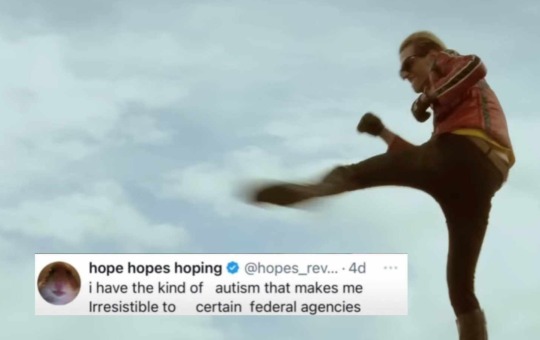







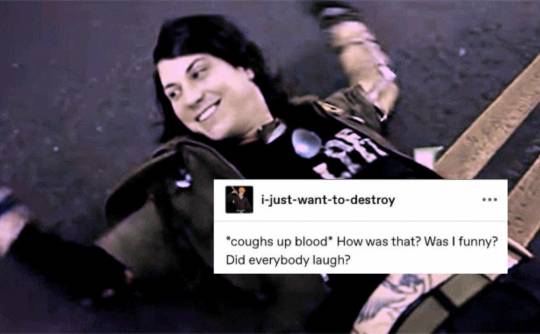
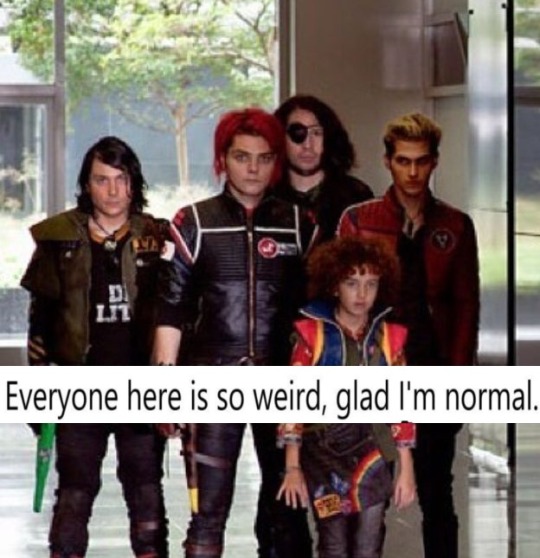
#more killjoy textposts of low quality#danger days#fun ghoul#party poison#jet star#kobra kid#fabulous killjoys#ttlotfk#i should cease and desist#i am unwell
420 notes
·
View notes
Text
"But you're so successful without it."
Content warning: This post contains mentions of suicidal ideation.
I got a message earlier tonight that I'm not going to post, but I did ask the person involved if I could talk about what we subsequently ended up talking about in DMs because I feel it's important.
Basically, it was along the lines of "My kid got diagnosed with ADHD and really wants to try meds. I know from reading your blog that correct treatment for ADHD can be really beneficial, but I just don't think she's severe enough to need them."
The message then went on to ask me, as someone who is unmedicated with ADHD, for some tricks and tips on how to be successful without medication because clearly, look how well I'm doing without them. I mean, look at my blog, look at my book(s)! Surely if I can do all that without ADHD meds, other people can too. Surely there's a trick. A skill. Something you can learn if you just try hard enough...
This is not the first time I have received a message like this. In fact, I probably get about 2-5 messages like this a week.
Usually from other people who also have ADHD/suspect ADHD but don't want medication because they don't think they need it/don't want to need it, and yet can't figure out why they're struggling so much, and ask me how do I do the thing(s) and cope so well and get so much done, etc., etc.
So I'm going to tell you what I told this person tonight in case it helps someone. Yes, I have ADHD. No, I am not medicated due to severe health complications, and yes, I get a lot done. From the outside, I am sure it looks incredibly productive and successful. But I'm going to let you in on what that success feels like.
It feels like dying.
It feels like my brain is on fire; every nerve in my body scraped raw; every part of me wired and exposed to the noise of the world. There is no quiet; there is no calm. And even when my brain does fall silent, it's another kind of death. The inside of my head is sludge, flowing uphill like treacle, weighing me down, pulling me under in the riptide of my inability to focus. I can see what needs to be done, I can see it so clearly, yet sometimes it's like I don't control my own body. Not enough dopamine. Not enough brain chemicals for the message I'm screaming in my head to make my limbs do the simplest of tasks. Like, feed myself. Take a shower. Answer that email. Text my friends back. Go to bed when I'm tired. Write a best-selling novel...
A novel that almost killed me and not because of my other ailments, but because of my unmedicated ADHD.
I didn't realize it at the time, but I was already operating at critical mass when I went into final rewrites/edits. Every coping mechanism I had fell apart. Like training wheels falling off a tricycle, leaving me to wobble unsteadily until the main wheels fell off, swiftly followed by the handlebars until all that was left was me peddling frantically trying to keep my balance and not getting anywhere. I didn't realize it then, but I was heading towards a complete mental collapse. And even when I dragged myself across the finish line with the above and beyond help provided by my friends and editors, I was so burned out I couldn't enjoy my success. Worse, my success made me suicidal.
It took me until very recently, almost two years later, to be able to read Phangs without feeling suicidal. My brain associated it with the trauma of experiencing complete ADHD burnout but having to complete a monumental task anyway.
I had to go into intensive therapy to recover. I am still in intensive therapy for it.
It took me even longer after that to be able to sit down and write without harming myself. I still struggle with it, and I tell you this in all honest sincerity in the hope it makes you realize what it costs me to be "successful" and unmedicated.
And this wasn't the first time I've had to deal with this, either.
I struggled all through high school, all through college, all through every career job I ever had, knowing there was something wrong, but not quite being able to put my finger on it because hey, I still got stuff done, so it couldn't be that bad, right? Surely everyone went through life feeling this way? Right?
...right?
It wasn't until I got my ADHD diagnosis as an adult that I realized what was happening. Why I struggled so much. Why life was so hard. In many ways, it was like the sun coming up. An internal dawning of realization and acceptance, but also rage.
So much rage.
Rage at how much I'd had to struggle because no one noticed because I was quiet and undisruptive. Rage at a system that forced me to learn in ways that were not intuitive to my brain. To always being told, "doesn't apply herself" while it felt like I was clawing my brain apart trying to do what people wanted from me. To a work-life balance, that rewards all the things that make ADHD actively worse. Rage. So much rage it hurts. And to top it all off, I can't be medicated for it. I finally know what's different, I finally know why my world feels raw and turned inside out, and I can't take any of the medications that might help me.
Do you know how angry I wake up every day that there is a possible solution just within my grasp, but my health conditions prevent me from trying them? Do you know how much it hurts? How much I grieve for the person I could be if I was able to have help beyond therapy and coaching? How much happier I could be...
Not productive. Not successful. Happy.
So ask yourself, what do you want more? A child who has to go through all of this and resents you for prolonging their suffering? Who winds up hating themselves by internalizing the false concept that if they just try hard enough, they can do whatever they set their mind to.
Or do you want to help them?
Or if this is you, why are you afraid to help yourself?
Please, don't use me as an example to harm yourself or others. Yes, I am successful without medication. But the toll is high. Too high.
Rid yourself of the idea that you need to suffer more to be allowed help. You don't. They don't. No one does.
#adhd#adult adhd#actually adhd#chronic health tag#suicide mention#suicidal ideation#long post#mental health#I am not for you to bludgeon other people with#kindly desist
11K notes
·
View notes
Text
Instead of the “Adblock is not allowed on YouTube” message, my video player got replaced by a Cease and Desist letter and a box prompting me to write a response.
623 notes
·
View notes
Text

simtimates™ made bgc | 📂
#ts4#ts4cc#maxis match#the sims 4#s4cc#ts4mm#sims4cc#ts4 maxis match#ts4 cc#sims 4 cc#ea pls don't hurt me#watch me get a cease and desist letter in the emails
2K notes
·
View notes
Text
You know how dreams will sometimes just make you feel strong emotions about what’s happening, but not always logical or proportionate?
I had a dream last night about a tiny little nowhere American town where there hadn’t been a single business left operating until this huge, massive surge of them all at once, cute little shops and restaurants suddenly opening by the hundreds, and everyone was happy about it but it seemed to me like just way way too much business for this little town or even any conceivable degree of tourism and I got a distinct impression that nobody involved at any level of it could explain it either.
And even though they weren’t under any shared brand, I felt like all these new shops and restaurants and stuff connected back to the same logo or mascot, and nobody questioned that either, and the moment I saw the mascot my dream self felt an INTENSELY horrible emotion I don’t have any word for. It was loosely like this visceral, sickening, profoundly dreadful sense of wrongness, hopelessness and loss, like something worse than death was coming to that town and everyone in it and it was too late to do anything about it and it was almost disgusting in turn that they were all so foolishly ignorant of the catastrophic devastation about to befall them.
So anyway this is my closest approximation of that mascot:

1K notes
·
View notes
Text
Trans research and scientific consensus
(2020) - Study of 139,829 students finds that in comparison to other students, transgender identity, especially non-binary identity, is associated more with perpetrating bullying than being bullied. Non-binary identity was most strongly associated with involvement in bullying, followed by [transgender] opposite sex identity and cisgender identity.
(2023) 21 leading experts on pediatric gender medicine from 8 countries wrote a letter to Wall Street Journal expressing disagreement over how gender dysphoria in youth is treated, voicing concerns against things such as the affirmative model and research conducted outside of the US has found hormonal interventions for gender dysphoria to be without reliable evidence. Among these international experts is Dr. Rita Kaltiala, chief psychiatrist at Tampere university gender clinic and author of several peer-reviewed studies on trans medicine and Finland's top authority on pediatric gender care.
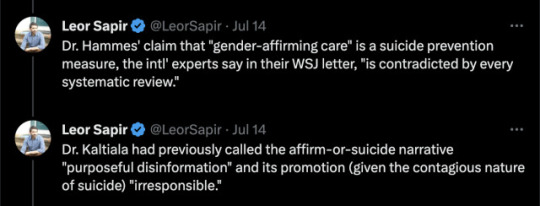
(2023) Landmark study from Denmark on 3,800 transgender patients pulled data from hospital records and applications from legal gender changes and discovered 43% of this group had a psychiatric illness compared with 7% of non-trans group, and despite "gender affirming care" and legal gender changes, still had 7.7 the rate of suicide attempts and 3.5 times the rate of suicide deaths. Researchers state this rate is likely even higher due to missing data.
(2016) Study finds association with increased risk of multiple sclerosis for trans women taking estrogen/reducing testosterone levels.
(2023) Metadata study shows, at best, no improvement for patients in gender-affirming care. "The conclusions of the systematic reviews of evidence for adolescents are consistent with long-term adult studies, which failed to show credible improvements in mental health and suggested a pattern of treatment-associated harms. Three recent papers examined the studies that underpin the practice of youth gender transition and found the research to be deeply flawed. Evidence does not support the notion that “affirmative care” of today’s adolescents is net beneficial."
(2011) Long term follow up of 324 transgender people having undergone sex reassignment surgery in Sweden, found that trans women retained male patterned incidents and rates of violence and had a greater significance and rate of rape and sexual violence than cisgender men. The study also found, "Persons with transsexualism, after sex reassignment, have considerably higher risks for mortality, suicidal behaviour, and psychiatric morbidity than the general population. Our findings suggest that sex reassignment, although alleviating gender dysphoria, may not suffice as treatment for transsexualism, and should inspire improved psychiatric and somatic care after sex reassignment for this patient group."
(2020) Largest study to date on 641,860 people finds association with autism and "gender diversity", "Gender-diverse people also report, on average, more traits associated with autism, such as sensory difficulties, pattern-recognition skills and lower rates of empathy — or accurately understanding and responding to another person’s emotional state".
(2022) US study examining 10 years of data on 952 people finds large percentages of young adults prescribed hormones for trans identity no longer getting the drugs 4 years later. Discontinuation rate for both sexes combined = 30%. Female discontinuation rate as high as 44%. The standard disinformation pushed is that only 1-2% of people who begin medical transition end up desisting. But these figures show that in this cohort of young adults, the overall rate of discontinuing hormone treatment ranged from a low of 10% to a high of 44% within a space of just 4 years.
Abruzzese et al. 2023 'The Myth of “Reliable Research” in Pediatric Gender Medicine: A critical evaluation of the Dutch Studies—and research that has followed'
More to come.
#trans#transgender research#transgender health#trans health care#gender critical#detrans#desistance#detransition#FTM#MTF#non binary#gender studies#gender identity#LGBTQ#trans identity#gender diverse#autism#gender dysphoria#gender affirming care#gender affirmation#transitioning#protect trans kids#protect trans youth
453 notes
·
View notes
Text

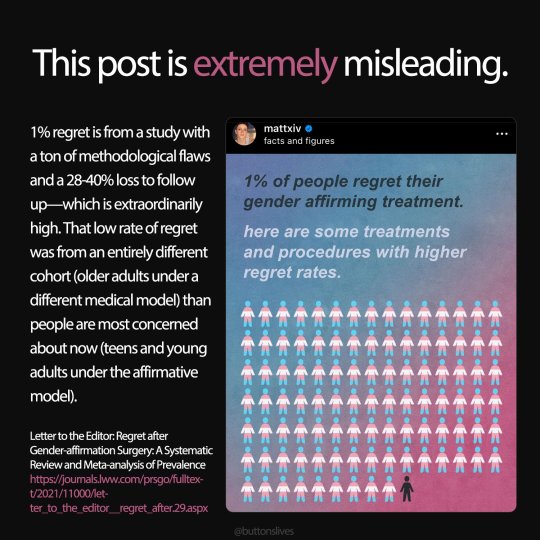
https://journals.lww.com/prsgo/fulltext/2021/11000/letter_to_the_editor__regret_after.29.aspx

https://academic.oup.com/jcem/article-abstract/107/9/e3937/6572526?login=false
https://www.sciencedirect.com/science/article/abs/pii/S1054139X22007194
https://www.mdpi.com/2227-9032/10/1/121

https://link.springer.com/article/10.1007/s10508-021-02163-w
https://www.bmj.com/content/380/bmj.p382

https://www.bmj.com/content/380/bmj.p382
https://www.reuters.com/investigates/special-report/usa-transyouth-outcomes/
https://link.springer.com/article/10.1007/s11930-023-00358-x
https://www.tandfonline.com/doi/full/10.1080/0092623X.2022.2150346
#Christina Buttons#desistance#transition regret#detrans#detransition#medical transition#gender ideology#genderwang#queer theory#sex trait modification#medical scandal#medical mutilation#poor evidence#weak evidence#medical malpractice#religion is a mental illness
626 notes
·
View notes
Text
Yo all y'all new twitter and reddit refugees.
if an account has the word 'official' in it this does NOT mean it's really official. You can call yourself anything on here. There is no verification.
So like, remember to take things they say with as much salt as you can manage.
#the few celebs snd real organizations on here proved it the old fashioned way#OFFICIAL usually means a parody blog or in at least one case#a person LARPING a government organization (they were 'asked' to Cease and Desist)#tumblr
643 notes
·
View notes